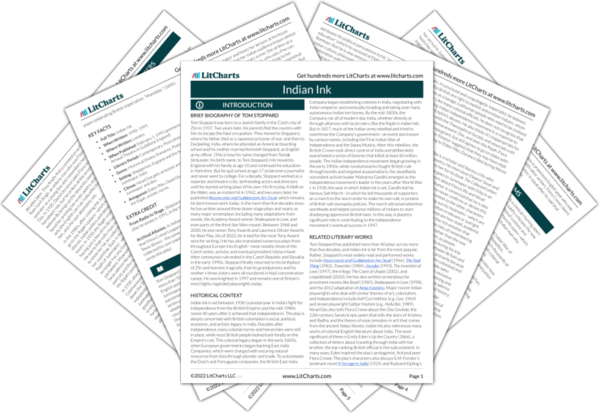“Bagpipe Music”
“Bagpipe Music” is a comical rhyming poem by the Irish writer Louis MacNeice. It subtly criticizes the way modern English society destroys traditional customs and communities. “Bagpipe Music” is Dilip’s favorite poem—which is ironic…
read analysis of “Bagpipe Music”
First Indian War of Independence
The First Indian War of Independence—also commonly known as the Rebellion, Uprising, or Mutiny—was a major conflict in which thousands of Indian soldiers attempted to overthrow the British colonial government in 1857-8. In Indian Ink…
read analysis of First Indian War of Independence
Punkah
A punkah is a traditional Indian pulley-operated fan, usually made of fabric, bamboo, or palm leaves suspended vertically from the ceiling. An operator (or punkah-wallah) has to flap the punkah back and forth by…
read analysis of Punkah
Rasa
In Indian philosophy, rasa is the dominant emotion in a work of art. Traditional sources describe eight or nine major rasas, including Shringara (love).
read analysis of Rasa
Salt March
The Salt March was a massive 24-day nonviolent protest campaign led by Mahatma Gandhi in 1930. The British colonial government banned Indians from producing salt but taxed them heavily for purchasing English salt. In response…
read analysis of Salt March
Get the entire Indian Ink LitChart as a printable PDF.

Shringara
Shringara is the rasa of romantic love, eroticism, and beauty. It is usually associated with the color blue and the god Vishnu.
read analysis of Shringara
Theosophical Society
The Theosophical Society is an organization founded by the eccentric Russian writer, traveler, and aristocrat Madame Blavatsky in New York. It attempts to link western and eastern (particularly Indian and Tibetan) thought in a way…
read analysis of Theosophical Society
Up the Country
Up the Country is the English writer and aristocrat Emily Eden’s book of letters about her travels to India in the late 1830s. Eden’s brother was the governor-general (the British Empire’s top official in India)…
read analysis of Up the Country












